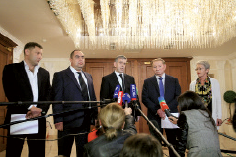 Taking part in the session were Heidi Tagliavini — the OSCE Chairperson-in-Office’s envoy for resolving the situation in Ukraine, alongside Leonid Kuchma — Ukraine’s former president, Mikhail Zurabov — the Ambassador Extraordinary and Plenipotentiary of Russia to Ukraine, Alexander Zakharchenko — the Prime Minister of the self-proclaimed Donetsk People’s Republic (DPR), Andrei Purgin — the Deputy Prime Minister of the Donetsk People’s Republic, and Igor Plotnitsky — the Head of the self-proclaimed Lugansk People’s Republic (LPR).
Taking part in the session were Heidi Tagliavini — the OSCE Chairperson-in-Office’s envoy for resolving the situation in Ukraine, alongside Leonid Kuchma — Ukraine’s former president, Mikhail Zurabov — the Ambassador Extraordinary and Plenipotentiary of Russia to Ukraine, Alexander Zakharchenko — the Prime Minister of the self-proclaimed Donetsk People’s Republic (DPR), Andrei Purgin — the Deputy Prime Minister of the Donetsk People’s Republic, and Igor Plotnitsky — the Head of the self-proclaimed Lugansk People’s Republic (LPR).The memorandum was signed by heads of the self-proclaimed republics and the Russia-Ukraine-OSCE contact group.
Initial talks on the Ukrainian crisis were held in Minsk on September 5th, resulting in a protocol being signed envisaging the cease of military action in the zone of the Ukrainian conflict.
Mr. Kuchma thanked Belarus for its organisation of contact group talks, stressing, “I’m grateful to Belarus and, personally, to the Belarusian President, Alexander Lukashenko, who provided us with everything we needed.” He also appreciated journalists’ patience — who waited seven hours to hear the results announced by Mr. Kuchma.
The parties have agreed to a mutual ceasefire (all involved sides, without exception), and the halting of military units at the frontline from September 19th, as well as the ban of all weapon use and offensive operations. In addition, within 24 hours of the memorandum’s signing, weapons of more than 100mm calibre must be pulled back at least 15km from the frontline (including from population centres). Heavy weapons and military hardware are banned from population centres, as is the planting of mines at the boundary of the security zone and all mines must be cleared. Military aircraft and foreign aircraft, with the exception of OSCE aircraft, are banned from flying above the security zone. An OSCE observer mission is to be deployed in the ceasefire zone within 24 hours of the adoption of the memorandum. All foreign armed groups, military hardware, militants and mercenaries are to be withdrawn from Ukrainian territory.
The Head of the self-proclaimed Lugansk People’s Republic, Igor Plotnitsky, noted that the ceasefire regime had been violated in some cases. “The memorandum will put a stop to this. There will be a full ceasefire. We believe that the signing of today’s document is a chance for all of us. Time has not been wasted today,” he asserted.
The role of Belarus and the Belarusian President, Alexander Lukashenko, in resolving the Ukrainian conflict has been praised by the UN Secretary General, Ban Ki-moon. On meeting Belarus’ Prime Minister, Mikhail Myasnikovich, in New York, he said, “I’d like to note the wise policy of the Belarusian President with regard to the situation in Ukraine. The ceasefire has been brought about purely thanks to the accord signed in Minsk. Your relations with both Ukraine and Russia put Belarus in a very good position. I hope that open dialogue will help improve the situation.”
In addition, the President of Ukraine, Petro Poroshenko, appreciates the importance of the Minsk-signed memorandum on the path to peace — as he noted in an interview with Ukrainian TV (text is placed on the President’s official site). According to Mr. Poroshenko, the document specifies the mechanism of ceasefire, creating a background for the termination of armed conflict. He also said that the country is doing its best to promote peace-making. “We can win through peace only,” Mr. Poroshenko stressed.











